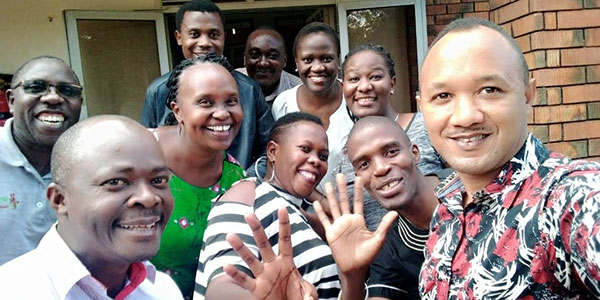Many people in this part of the continent are especially vulnerable to the impacts of coronavirus, as livelihoods are already under threat from unpredictable and extreme weather. Here in Uganda, according to a Spark Microgrants report, over 86 per cent of people indicated that food availability and economic opportunities were now affecting their communities.
The government has issued a lockdown for a period of three months and as a result, access to agricultural supplies has become difficult, and basic items have become more expensive. Village savings activities have been halted, the majority of the population have not been able to access health services and unfortunately, gender–based violence has increased.
People living from the land in remote rural areas are anxious about how they will cope.
Prevention and overcoming barriers
Send a Cow Uganda has collaborated with local government to slow and stop transmission of the virus. We have been doing this through a combination of community engagement, awareness raising, improving sanitation and counselling.
Community engagement: Our project workers have been supporting self help groups, through a community resource person (CRPs), or the group chair to give project updates, monitor communities and ensure that Covid-19 prevention measures are embraced. In order to overcome the physical barriers and keep people safe, the CRPs and chairs have been given mobile phone credit to reach out to group members.
Awareness raising: In collaboration with the local government, Send a Cow has been helping to share vital messages to whole communities through radio talk shows.
Improving sanitation: Water sanitation and hygiene training are a crucial part of our programmes. In light of Covid-19, we’ve increased washing points by constructing locally made ‘tip taps‘. Families were given bars of soap and health centres received handwashing facilities and liquid soap.

Counselling services: Households have received counselling services from CRPs and Send a Cow extension workers via mobile phone conversations, owing to lock down restrictions.
Addressing the Covid impact
In addition to the immediate health implications, the longer-term risks of severe food insecurity, loss of livelihoods, and even famine are of huge concern to all of the staff at Send a Cow. The second phase of our response will support communities as follows:
Food security: Supporting the longer–term recovery of affected communities will mean creating community plans, particularly around agricultural productivity so there is access to nutritional food, and to avoid the shortages that are predicted.
Employment and income: Send a Cow will support households to re-build livelihoods and create ‘On and Off Farm’ income–generating initiatives, to absorb the economic shock from coronavirus.
Social relations: As a result of increased gender–based violence cases at household and community levels, there is more need to provide ongoing counselling services and for people who have been affected.
Life after lockdown
While there were lockdowns during the Ebola outbreak, the nature of current restrictions is unprecedented in Africa, with border controls becoming much tighter and cross-country trade hugely restricted.
For people in Uganda who are living in poverty, food is the main concern. Markets have been closing to prevent the spread of coronavirus, and normal food supply chains for communities are already disrupted.
At Send a Cow, we work to make sure no-one in the community is left behind, but with vulnerable groups even more at risk, helping people to become food secure is now more important than ever.
To find out more, or to donate to Send A Cow’s coronavirus appeal projects, click here.
Send a Cow is a charity partner of organic veg box company Riverford. Through support from Riverford customers, Send a Cow has been able to deliver The Rakai Orphans Livelihoods Project. Over four years, the project has helped 2,466 people in four districts in Uganda. 400 orphan headed households are now food secure, have increased confidence, and multiple sources of income to support their families: Thank you!












0 Comments